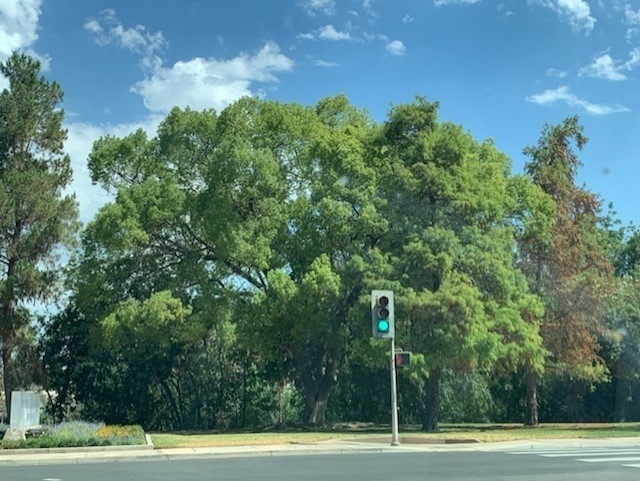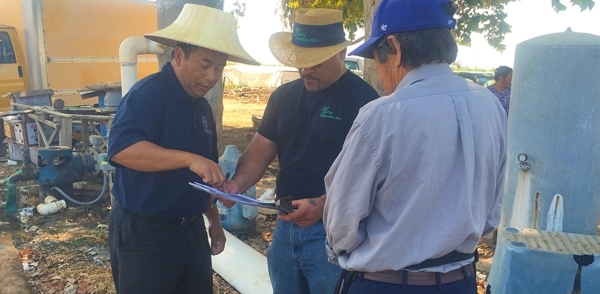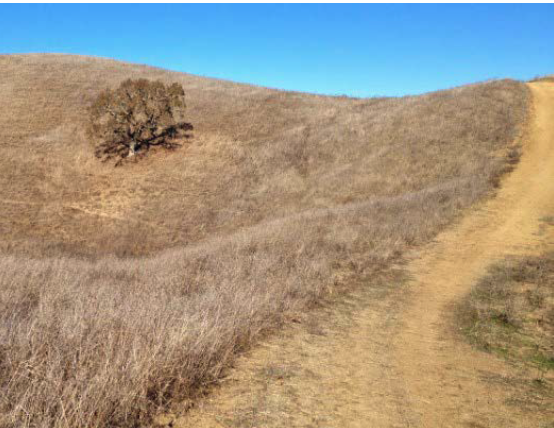Posts Tagged: ChatGPT
Be Wary of Relying on Chat GPT for Agricultural Questions
Globally, approximately 570 million small and medium-sized farms need training in various agricultural fields. However, the delivery of agriculture training faces significant challenges. In some areas, the difficulty in obtaining this training has led to...
Lawn-pocalypse! Surviving Drought
Ah, summer! The season of sunburns, pool parties, and… lawn droughts. If your once lush, green carpet now looks like a crunchy brown doormat, you're not alone. Let's dive into why your yard is staging a dramatic death scene and what you can do to...

Bermuda grass and weeds overtaking drought stressed turf grass.
UC ANR guidelines for using AI tools in the workplace
With technology advancements such as ChatGPT, Google Bard and other artificial intelligence (AI)-driven platforms, there's growing enthusiasm within our community to leverage these tools and integrate them into the university context. The following advisory provides guidance on how to use these tools safely, without putting institutional, personal or proprietary information at risk. Additional guidance may be forthcoming as circumstances evolve.
UC ANR recognizes the potential for AI technologies to perpetuate biases and inequalities if not implemented and monitored carefully. Therefore, all AI systems and algorithms used within the university must undergo thorough scrutiny for bias and fairness throughout their development, deployment and ongoing usage.
Implementing AI in our Workplace
If you are looking to implement a new AI tool or process, please review the following guidelines and review the Responsible use of Artificial Intelligence Report, then contact Bethanie Brown at brbbrown@ucanr.edu and Jaki Hsieh Wojan at jhsiehw@ucanr.edu.
HR and IT will conduct a thorough assessment of the information security, employee and labor relations implications associated with the selected AI tools. They will provide you with support and recommendations regarding the appropriateness of these tools.
AI Training
A thorough training on the use of AI is required for all employees leveraging AI tools in the workplace. UC Berkeley has made their AI Essentials training publicly available and is highly recommended. Other training programs may be available for use, please contact UC ANR Human Resources at humanresources@ucanr.edu for additional information.
Prohibited Use
- AI tools may not be utilized in situations where they impact an employee's personal information, health and safety or conditions of employment, unless otherwise specified by policy or law.
- Any use of ChatGPT should be with the assumption that no personal, confidential, proprietary or otherwise sensitive information may be used with it. Information classified as Protection Level P2, P3, or P4 should not be used.
- Similarly, ChatGPT or other public AI tools should not be used to generate output that would be considered non-public. Examples include, but are not limited to, proprietary or unpublished research; legal analysis or advice; recruitment, personnel or disciplinary decision making; completion of academic work in a manner not allowed by the instructor; creation of non-public instructional materials; and grading.
- Please also note that OpenAI explicitly forbids the use of ChatGPT and their other products for certain categories of activity, including fraud and illegal activities. This list of items can be found in their usage policy document.
Precautions
- Ethics
It is imperative to prioritize the well-being and rights of employees by ensuring human oversight and accountability. The use of AI to make high-stakes decisions or penalize employees should be avoided. In addition to the consideration of the ethical implications, clear processes, procedures and standards and potentially union notifications must first be put in place prior to leveraging AI that impacts an employee's conditions of employment.
- Scams
Be wary of fake websites attempting to mask as popular AI apps. This article shares how to tell ChatGPT scams apart from the real ChatGPT website (link is external).
- Errors and “Hallucinations”
When using generative AI tools like ChatGPT, Google Bard and similar technologies for business purposes, be vigilant about "hallucinations" — moments when the AI generates unverified or incorrect information. Always cross-check the tool's output for accuracy before incorporating it into university-related tasks. While generative AI is potent, it can occasionally produce false or misleading content. Ensure all facts and figures generated by these tools are independently verified through non-AI sources before use. In other words, don't simply copy and paste what is produced into your work.
- Bias
When using Large Language Models (LLMs) like ChatGPT, it's important to recognize that the datasets used to train the models may be trained on incomplete or biased data. Implicit and systemic biases can inadvertently be built into AI systems. Such biases run counter to UC ANR's institutional values of diversity, equity, and inclusion. Therefore, using outputs in a way that amplifies these biases can be contrary to our shared institutional values.
- Illegal Content
Data sets used to train AI, and the resulting models, can also contain illegal content. It is important to be aware of what data sets contain and to avoid storing illegal content on UC systems, even inadvertently. Register data sets you are using with HR and IT, and be sure to notify immediately both units if you find or become aware of illegal content.
Potential Opportunities for Use
Publicly available information (Protection Level P1) can be used freely in ChatGPT. In all cases, use should be consistent with the UC ANR Principles of Community. Areas to consider the use of AI:
- Promotional Materials, Image and Video Production
Automate the creation of promotional material. Edit and create images, as well as voiceover tracks for videos, to elevate your media production. - Coding and Web Development
Draft code for common programming tasks, accelerating the development process. - Job Descriptions and Postings
Use templates to suggest customized language for position overviews, key responsibilities and qualifications. Review the language to ensure it is free from unintended biases as biased wording may discourage certain groups from applying, potentially impacting the diversity of the applicant pool. - Training and Onboarding
Develop training materials and FAQs for new tools and automate responses to common questions during staff training sessions. - Website and Communications Content
Edit text for clarity and grammar, suggest optimal layouts, headlines and meta descriptions, and draft content for course listings, prerequisites or institutional information.
References
- Educator considerations for ChatGPT
- OpenAI sharing & publication policy
- OpenAI usage policies
- OpenAI privacy policy
- OpenAI terms & policies
- UCLA: Data Protection Guidance
- UCB: Appropriate use of AI Tools
- UCSD: Using AI Tools in Administration
Climate-Change Resources
University of California UC ANR Green Blog (Climate Change and Other Topics) https://ucanr.edu/blogs/Green/index.cfm?tagname=climate%20change (full index)
Examples:
- Save Trees First: Tips to Keep Them Alive Under Drought https://ucanr.edu/b/~CdD
- Landscaping with Fire Exposure in Mind: https://ucanr.edu/b/~G4D
- Cities in California Inland Areas Must Make Street Tree Changes to adapt to Future Climate https://ucanr.edu/b/~oF7
Drought, Climate Change and California Water Management Ted Grantham, UC Cooperative Extension specialist (23 minutes) https://youtu.be/dlimj75Wn9Q
Climate Variability and Change: Trends and Impacts on CA Agriculture Tapan Pathak, UC Cooperative Extension specialist (24 minutes) https://youtu.be/bIHI0yqqQJc
California Institute for Water Resources (links to blogs, talks, podcasts, water experts, etc.) https://ciwr.ucanr.edu/California_Drought_Expertise/
UC ANR Wildfire Resources (publications, videos, etc.) https://ucanr.edu/News/For_the_media/Press_kits/Wildfire/ (main website)
-UC ANR Fire Resources and Information https://ucanr.edu/sites/fire/ (main website)
-Preparing Home Landscaping https://ucanr.edu/sites/fire/Prepare/Landscaping/
UC ANR Free Publications https://anrcatalog.ucanr.edu/ (main website)
- Benefits of Plants to Humans and Urban Ecosystems: https://anrcatalog.ucanr.edu/pdf/8726.pdf
-Keeping Plants Alive Under Drought and Water Restrictions (English version) https://anrcatalog.ucanr.edu/pdf/8553.pdf
(Spanish version) https://anrcatalog.ucanr.edu/pdf/8628.pdf
- Use of Graywater in Urban Landscapes https://anrcatalog.ucanr.edu/pdf/8536.pdf
- Sustainable Landscaping in California https://anrcatalog.ucanr.edu/pdf/8504.pdf
Other (Non-UC) Climate Change Resources
Urban Forests and Climate Change. Urban forests play an important role in climate change mitigation and adaptation. Active stewardship of a community's forestry assets can strengthen local resilience to climate change while creating more sustainable and desirable places to live. https://www.fs.usda.gov/ccrc/topics/urban-forests
Examining the Viability of Planting Trees to Mitigate Climate Change (plausible at the forest level) https://climate.nasa.gov/news/2927/examining-the-viability-of-planting-trees-to-help-mitigate-climate-change/
Reports and other information resources coordinated under the auspices of the United Nations and produced through the collaboration of thousands of international scientists to provide a clear and up to date view of the current state of scientific knowledge relevant to climate change. United Nations Climate Action
Scientific reports, programs, action movements and events related to climate change. National Center for Atmospheric Research (National Science Foundation)
Find useful reports, program information and other documents resulting from federally funded research and development into the behavior of the atmosphere and related physical, biological and social systems. Search and find climate data from prehistory through to an hour ago in the world's largest climate data archive. (Formerly the "Climatic Data Center") National Centers for Environmental Information (NOAA)
Think tank providing information, analysis, policy and solution development for addressing climate change and energy issues (formerly known as the: "Pew Center on Global Climate Change"). Center for Climate & Energy Solutions (C2ES)
Mapping Resilience: A Blueprint for Thriving in the Face of Climate Disaster. The Climate Adaptation Knowledge Exchange (CAKE) was launched in July 2010 and is managed by EcoAdapt, a non-profit with a singular mission: to create a robust future in the face of climate change by bringing together diverse players to reshape planning and management in response to rapid climate change. https://www.cakex.org/documents/mapping-resilience-blueprint-thriving-face-climate-disaster
Cal-Adapt provides a way to explore peer-reviewed data that portrays how climate change might affect California at the state and local level. We make this data available through downloads, visualizations, and the Cal-Adapt API for your research, outreach, and adaptation planning needs. Cal-Adapt is a collaboration between state agency funding programs, university and private sector researchers https://cal-adapt.org/
Find reports, maps, data and other resources produced through a confederation of the research arms of 13 Federal departments and agencies that carry out research and develop and maintain capabilities that support the Nation's response to global change. Global Change (U.S. Global Change Research Program)
The Pacific Institute is a global water think tank that combines science-based thought leadership with active outreach to influence local, national, and international efforts to develop sustainable water policies. https://pacinst.org/our-approach/
Making equity real in climate adaptation and community resilience policies and programs: a guidebook. https://greenlining.org/publications/2019/making-equity-real-in-climate-adaption-and-community-resilience-policies-and-programs-a-guidebook/
Quarterly CA Climate Updates and CA Drought Monitor Maps (updated each Thursday) https://www.drought.gov/documents/quarterly-climate-impacts-and-outlook-western-region-june-2022
Drought focus of Water Resources IMPACT magazine special issue
UC ANR experts address emotional toll of drought
Preparing the American West for prolonged drought is the focus of a double issue of Water Resources IMPACT magazine. The California Water Commission staff are guest editors for this special open-access edition of the magazine, which is published by the American Water Resources Association.
Faith Kearns, academic coordinator of University of California Agriculture and Natural Resources' California Institute for Water Resources, is among the authors delving into how drought impacts people and the environment and how we can better prepare for the inevitable.
The first issue, published on Feb. 14, focuses on water scarcity issues confronting California and the ways these issues affect different sectors.
In “Trauma, Care, and Solidarity: Addressing the Emotional Toll of Chronic Drought,” Kearns highlights the effects of drought on mental health. She points to the spike in suicide hotline calls when wells ran dry in Southeast Asian communities in California's Central Valley.
By listening to Southeast Asian farmers, Ruth Dahlquist-Willard and Michael Yang of UC Cooperative Extension were able to “lighten the load” for them by providing pragmatic support, Kearns writes.
“The scale of some of these highly emotional issues – drought, wildfires, climate change – can make them seem incredibly difficult, if not impossible, to deal with,” Kearns said. “At the same time, they are affecting everyone living in the western U.S. on a daily basis. I wanted to highlight and provide models based on work that people – whether they are researchers, clinical psychologists, or Cooperative Extension advisors – are doing right now to ease the way.”
The authors who contributed to the double issue are a diverse array of Tribal experts, academics, nongovernmental organization thought-leaders, water managers and water policy influencers, each of whom brings their own perspective on the topic of drought. Their expertise and perspectives in climate science, water policy and water management will help inform drought-related decision-making and support policies that better prepare the state to thrive during periods of prolonged water scarcity.
In addition to Kearns, the first issue includes articles contributed by:
- Samantha Stevenson, University of California, Santa Barbara
- Jay Lund, University of California, Davis
- Ron Goode, North Fork Mono Tribe
- Andy Fecko, Placer County Water Agency
- Jeff Mount, Public Policy Institute of California, and Ted Grantham, University of California, Berkeley/UC Cooperative Extension
- Nat Seavy and Karyn Stockdale, National Audubon Society
- Kjia Rivers, Community Water Center
- Cannon Michael, Bowles Farming
- Michelle Reimers, Turlock Irrigation District
The January/February edition of Water Resources IMPACT magazine can be accessed, free of charge, on the American Water Resources Association website at https://www.awra.org under “Publications.”
The second issue, to be published in March, will focus on drought response, considering the options for adaptation. This two-part series complements the Commission's work on strategies to protect communities and fish and wildlife in the event of a long-term drought.



